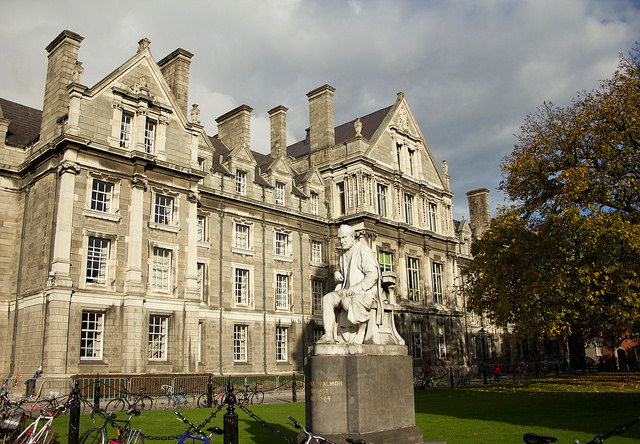
Amidst their recent Ard Fheis and their continual resilience in nationwide opinion polls, the seemingly inevitable incumbency of Sinn Féin in political office has been a matter on the lips of many. Speculation as to just what such a government would entail has been abound and it was amidst such an environment that the Dublin University Philosophical Society (the Phil) held the penultimate event of their term card, ‘This House Prefers a Sinn Féin Government’.
On the card for the evening was an intriguing selection of guests. Fine Gael TD Paschal Donohoe, the former Finance Minister and current Minister for Public Expenditure, National Development Plan Delivery and Reform was present. Also there was former BBC Northern Ireland Political Editor, Mark Devenport. Regretfully, planned speakers Eoin Ó Broin and John Finucane of Sinn Féin could not make it on the night, their collective vacancy duly filled by Martin Kenny TD, the party’s spokesperson on Communications and Transport.
However, the debate was to paint a dispiriting picture of the current political landscape and the seemingly ever-deteriorating state of political discourse in the present age. Party lines and predisposed ideological inclinations took centre stage at the expense of any wholeheartedly well-reasoned discussion.
The problems started to reveal themselves amidst Martin Kenny’s speech in the opening half of proceedings, something that was more akin to an aloof rattling off of Sinn Féin’s upcoming manifesto pledges than something suited to a chamber debate. Kenny’s indifference to his environment was exemplified by his exceeding the designated time limit. It was a disappointing delivery, but perhaps understandable considering the late notice with which he was parachuted into the evening’s debate.
László Molnárfi lit the fuse on what was up to that point a somewhat catatonic debate. The President of the Trinity College Students’ Union (TCDSU) stoked considerable tension in the chamber with his speech, turning the atmosphere into that of a cauldron by the end of his seven minutes. Molnárfi attacked Sinn Féin from the left and articulated many of the banes of the status quo of electoral politics, but his rather clichéd revolutionary language invoked much ire from onlookers. As did a tentative reference to the October Revolution, at which point the speaker would be drowned out by the collective discontent of the audience.
Paschal Donohoe closed the debate with his summative speech. His disparaging of a supposed lack of substance as to the improvements which a Sinn Féin government would implement went down well with the chamber and was pivotal in the result of the eventual fall of the motion. It was certainly a rhetorician’s speech, his past tutelage over The Phil as Secretary in the 1990s made evident in a scathing display of showmanship. Ironically, however, his own words were also rather devoid of material. In attacking a lack of direction from the opposition, there was no outlining of his own government’s vision or pronouncements of success. And how can he reasonably expect every single tenet of policy and every abundant problem to be addressed in a handful of seven minute speeches from student speakers? It seemed like an unreasonable expectation and one that he did not live up to himself throughout the course of his speech.
In a debate that exhibited the fractious and viciously circular nature of the political realm, some solace could be afforded perhaps in the words of Mark Devenport, a man bound to be experiencing some fatigue with politics given his longstanding reporting on the subject. He advocated for scepticism in the face of the party political system; a vesting of too much faith in any one movement within such an ecosystem is bound to be setting both yourself and the subject of your support up for a grand fall.
It was a fascinating debate on the whole, a microcosm of politics situated entirely within the GMB. Props must be given to The Phil for capturing and bottling this very essence within the course of an hour and a half.






